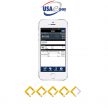
Best Security Practices For Accepting International Payments
Most business owners want to reach the widest customer base possible, and this will oftenmean selling directly to a global audience.
Serving a broader range of customers has its obvious advantages such as expanding your customer base,potentially increase your profits and building awareness of your brand. However, this wider audience can also lead to a set of issues that you’ll need to overcome.
Aside from the obvious challenges that come with global ecommerce, like handling international payment processing and complying with regulations, there are some security precautions you need to take when accepting international payments.
If you’re a merchant accepting – or considering accepting – international payments – here are some of the steps you should implement.
Verify Your Customers
Ecommerce fraud is a growing concern, with fraud more prominent in international markets, a report from LexisNexis indicates
Who is the customer you’re dealing with? As a merchant, it can be difficult enough to know who you’re trading with at the best of times – especially online where it can be far too easy to impersonate someone else – but identifying a customer as legitimate is even harder when you’re accepting international payments.
Overcoming this hurdle means carrying out another level of checks. For some merchants, this could involve introducing ID verification software or the use of biometrics to further confirm a person’s ID.
Whichever verification method you choose, make it part of company policy and ensure every member of staff knows to apply the additional checks before approving an international transaction.
Select the Most Secure Payment Method(s)
Some payment methods do have a higher incidence of fraud than others. For instance, wire transfer fraud is a known issue. And check payments can be open to forms of fraud, such as mail fraud.
Certain countries are also more prone to certain types of fraud. Indonesia,Venezuela and Brazil were once named as among the worse for ecommerce fraud, whilewire fraud is costing U.S. residents billions every year and often in international transactions.
The FBI arewarns that wire fraud in the U.S. is on the increase. Numerous U.S. companies have been targeted recently so the payment method you accept it something you should think about carefully.
You’ll never find a payment method that is hundred percent safe, however, you can enhance security by choosing payments that require extra checks, like credit card payments, which can be flagged as potentially fraudulent by your payment processor should any ‘red flags’ or inconsistences occur.
Other international payment methods include:
- An international payment gateway, to accept multiple currencies from multiple countries.
- PayPal, to allow customers to make payments without having to give out their card details. There is also a dispute resolution service should a problem arise with a transaction.
- International electronic bank transfers.
- Letters of credit, when the bank will act as a guarantor and the funds must be available in the account at the time of the transaction.
Select a Reputable Ecommerce Platform
A professional ecommerce platform is a necessary precaution, especially when you’re trading internationally, and it can go a long way to improving your security. Among the most popular platforms are Shopify, which is PCI Level one.
If you’re new to selling internationally, or just want to increase your security, ask your chosen payment processor which other security steps you should be taking.
Scrutinize International Sales More Carefully
Although it will take longer to approve a transaction, screen payments as they come through, especially if they are from countries that are known to have high levels of fraud.
Other key things to look for are:
- Inconsistencies between names and addresses and contact numbers.
- Unusual patterns in spending.
- Shoppers who are frequently buying high value goods in volume and within short periods.
In addition, merchants shouldinsist on a CVV number of card payments; you can set up system alerts for screening, so the processcan be automated.
There are some further steps you can take to enhance security:
- Retailers should also be certain that they are sending the items to a confirmed address and ignore requests to send items to an alternative address. If you send out items to anunconfirmed address and the transaction turns out to be fraudulent you won’t be covered by some payment methods. For instance, some third-party payment processors won’t reimburse transactions that go to dispute if they weren’t sent to a confirmed address.
- Making use of IP geolocation data is a further anti-fraud tool that merchants can introduce and can be helpful when accepting international payments.
Work Hand in Hand With Your Payment Processor
Your payment processor does far more than just allowing you to securely collect payments from customer: a good payment processor work with you to reducefraudulent transactions and keep your data safe.
For example, they can:
- Provides encryptionand tokenization services
- Help you to ensure that you are PCI compliant
- Provide you with a secure platform for accepting online transactions
- Supply you with fraud prevention tools to help flag potentially fraudulent transactions
Working closely with your payments processor can also help to curb the number of chargebacks.
Lowering fraud and chargebacks are the most concerns for merchants and research from the Merchant Risk Council showsthat fears over chargebacks are at the forefront of most merchants’ minds. However, when you team up with a payment processor, you’ll have an extra layer or protection and some assistance in fighting chargebacks.
Conclusion
The global ecommerce market is worth $22 billion a year on its own. These figures illustrate just how important selling online can be to your business, however, once you establish a wider customer audience to sell to, the levels of fraud are naturally going to climb.
And fraud is not just rising among ecommerce businesses, it’s a growing issue among multi- channel retailers.
High levels of fraud mean all retailers need to take precautions when dealing with transactions. However, due to fraud issues, along with the difficulty of knowing who you are selling to when dealing with international transactions, it’s imperative that you take extra precautions and that you work closely with a good payment processor that can advise you on the most effective tools for your business.
Ready to get started?
Get in touch or create an account





